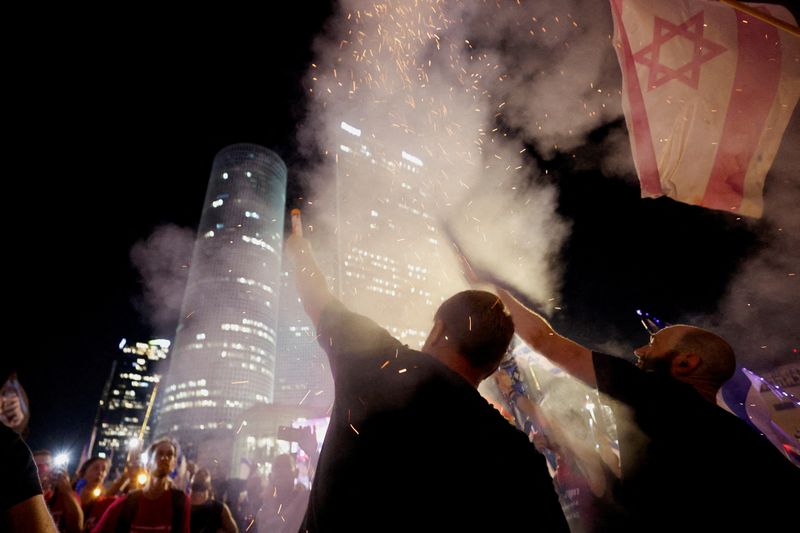JERUSALEM (Reuters) -Israel’s Supreme Court on Monday said all 15 judges in a historic first would take part in a hearing on arguments against a law that Prime Minister Benjamin Netanyahu’s religious-nationalist coalition passed as part of an overhaul of the judiciary.
The Supreme Court agreed to discuss on Sept. 12 petitions to strike down the bill ratified last week that limits its powers to void some decisions made by government and ministers, setting the scene for a constitutional showdown.
A court spokesperson said the hearing would mark the first time in the country’s history an extended bench would preside.
The judicial changes pursued by Netanyahu and his government have sparked an unprecedented crisis in Israel, opening deep divides in society, bruising the economy and drawing concern from Western allies.
The divide has spread to the military, with volunteer reservists saying they will not report for duty and former top brass warning that Israel’s war-readiness could be at risk.
On Monday, Israeli Defence Minister Yoav Gallant told parliament’s Foreign Affairs and Defence Committee that the military remained combat-ready in the face of mounting protests, but there may be damage in the long term.
Netanyahu’s coalition says the judicial changes are needed to curb what it describes as overreach by a Supreme Court that it says has become too politically interventionist.
“Israel’s governments have always made sure to respect the law and the court’s rulings, and the court has always made sure to respect the Basic Laws,” Netanyahu’s Likud party said in a statement, referring to laws that function as Israel’s formal constitution. “These two elements form the basis of rule of law in Israel and of the balance between the authorities in any democracy.”
Critics say the changes would remove effective checks on the executive’s authority and could lead to abuses of power.
Israel’s democratic foundations are relatively fragile and the Supreme Court is seen as crucial for protecting civil rights and the rule of law. The country has no constitution, the government holds a 64-56 majority in the one-chamber Knesset and the president’s office is largely ceremonial.
Among the petitioners are the Israel Bar Association and a political watchdog group that said the July 25 amendment “fundamentally changes the structure of Israeli parliamentary democracy and the character of government”.
(Reporting by Henriette Chacar; Editing by Ari Rabinovitch, Barbara Lewis, Bill Berkrot and Leslie Adler)
